- Home
- Lauren Oliver
Broken Things Page 3
Broken Things Read online
Page 3
Later, after Wade and I do our obligatory chat—the most painful part of the whole process, as far as I’m concerned, since I have to pretend to actually be happy to see him and he just sits there with a dopey smile on his face, like a kid in front of a mall Santa Claus—I walk out with him to say goodbye, carrying an empty plastic soda cup from the cafeteria, fitted with a lid and straw. There are always so many people signing in and getting waved through security or blubbering while they talk to the counselors, it’s no big deal to use the visitors’ bathroom without anyone noticing. The pee goes in the soda cup, and then in the shot-glass-size containers the counselors distribute with my name written in Magic Marker on the label. Just in time to flunk my drug test and land myself a very late checkout.
Maybe I’ll get to stay for ninety days this time.
“Thank you, Ellen,” the fat guy in the badly fitting suit says, and then puts on his bad-news voice. “In other news, the town of Twin Lakes is preparing to commemorate the fifth anniversary of the tragedy at Brickhouse Lane—”
All the air goes out of the room. Half the girls turn to stare at me. The rest of them go still, as if they’re worried the slightest motion will cause an avalanche.
“—in which, on a seemingly normal Tuesday afternoon, thirteen-year-old Summer Marks was viciously murdered.” A picture of Summer flashes and my heart closes up, fist-like. She looks so young. She was so young: our thirteenth birthdays, only three days apart, had passed two weeks before she was murdered. And yet when I imagine her, and when she comes to me—which she still does, in quick impressions, popping in and out of dreams or running through my memories the way she used to run through the woods, suddenly full of light and suddenly plunged into shadow—she’s always my age. Or maybe I’m her age, back when she was my everything.
“Suspicion quickly fell on Summer’s then-boyfriend and two best friends, who had been obsessed with a little-known and especially violent children’s book—”
Please don’t show the picture. My lungs feel as if they’re being flattened to paper. Please don’t show the picture.
“Turn it off,” one of the counselors says sharply. Jocelyn is looking for the remote on the carpet, where it has become lost in the tangle of legs and blankets and soda cups. And it’s too late, anyway. A second later, the picture is on the screen, the infamous picture.
In it, Mia and I are dressed up for Halloween like the Reapers of Lovelorn, wearing black hoodies and lots of eyeliner that Summer pocketed from a local CVS and carrying homemade scythes fashioned from tinfoil and broom handles. And Summer, standing between us, is the Savior: in all white, her blond hair pinned and curled, her lips bloodred and pulled into a smile and a matching circle of red around her neck, too. The news has fuzzed out my face and Mia’s as if with a giant eraser, but Summer’s face is perfectly clear, grinning and triumphant.
I didn’t even want to be a Reaper. I thought we should dress up as the original three—Ava, Ashleigh, and Audrey—but Summer said that would be boring. It was all Summer’s idea.
“So wait. Which one is you?” Zoe asks, turning to me. Zoe is new. She got out of the detox unit only a few days ago and since then has done nothing but sit sullenly in group, chewing on the sleeve of her hoodie or staring at the ceiling fan as if it’s the most fascinating thing in the universe.
“The remote.” The buzz is building among the counselors. Jocelyn is shoving people aside, rolling other girls onto their hips, trying to find the lost remote.
“The case against the two girls was soon dropped, and Summer’s boyfriend was ultimately acquitted, due largely to objections by the defense that the investigation had been mishandled.” He pauses and lets this sink in for a minute, staring at the camera sadly, as if to say that this, the failure to put us in jail for the rest of our natural lives, is an absolute travesty.
He doesn’t say that the cops never even cautioned us before dragging us down to the police station, so nothing we told them would have held up in court. He doesn’t say that Owen’s defense turned up evidence of insane police incompetence: the DNA sample that supposedly showed his blood intermingled with Summer’s at the crime scene had actually been left in the back of a police van for forty-eight hours and was so broken down by heat that it was ruled inadmissible.
“That is you, right?” Zoe repeats, now looking hurt by my refusal to acknowledge her.
“Five years later, this small, tight-knit community is still shattered by the incomprehensible horror of this crime, and on Sunday plans to host a memorial to—”
The TV goes blank. Jocelyn has at last found the remote, and she sits there panting, like a dog that’s worked too hard to find a bone. There’s an electric silence, somehow louder than any sound. Everyone is watching me, or deliberately not watching me, as if they’re afraid I’ll scream or throw something or maybe just start crying.
Or maybe they’re just afraid.
“Well.” Trish springs to her feet, false cheerful, clapping her hands. “What’s it going to be tonight? Last week there was a vote for Tangled—should we watch that?”
No one answers. The room is still laced with tension. I stand up, slightly dizzy, not caring that this will make it worse. No one says anything as I force my way out into the hall, stomping over popcorn kernels and plastic cups, stepping on a girl’s hand. She yelps and then goes quickly quiet.
The hall is empty and cool—an AC thrums somewhere in the walls. As soon as I’m alone, my eyes start to burn and blink fast; I’m not even sure why I’m crying. Maybe it was seeing Summer’s face on TV—that crazy-beautiful heart-shaped face, all big eyes and thick lashes, smiling like she always had a secret.
The pay phone at the end of the hall is etched with initials of previous patients. The receiver smells like bubble gum, and it’s always coated with a thin moisture-film of sweat and lotion. I try to keep it far away from my cheek as I pull out my phone card—sold in the Four Corners store next to racks of stuffed animals and motivational T-shirts—and punch in Wade’s number.
He picks up on the first ring.
“It’s Brynn,” I say, instinctively lowering my voice, even though there’s no one in the hall to eavesdrop. “You’re still coming tomorrow, right? You’re not listening to all this bullshit about a hurricane?”
“Brynn! Hi!” Wade always speaks in exclamation points. “I’m still . . .” His voice fades out and I have to wrench the phone away from my ear as a brief series of cracks and pops explodes through the line.
“What?” I knuckle the phone a little harder. “I can’t hear you.”
“Sorry!” Another series of cracks, like the sound of someone balling up tinfoil, disturb the line. “The wind’s bad already. They say we’re going to get maybe three feet of rain. River’s supposed to . . .” His voice fades out again.
“Wade,” I say. I can still hear him talking, but his words are hopelessly distorted. “Wade, I can’t understand you. Just tell me that we’re on for tomorrow. Promise me, okay?”
“I can’t control the weather, Brynn,” he says. Another annoying thing about Wade is that he comes out with deeply obvious statements as if they’re major pieces of wisdom.
“Listen.” At this point I’m pretty much desperate. I need Wade. I’m not leaving Four Corners. I’m not going back into a world of people who stare at me or, even worse, choose to ignore me altogether—push past me on the sidewalk, refuse to serve me at the diner, look straight through me, as if I don’t exist. “Just say you’ll be here, okay? I have something I want to tell you. It’s important.” All bullshit, obviously, and like I said, I’m not a liar by nature. But I’ve learned to look out for myself. I’ve had to.
“What kind of something?” His voice turns suspicious—but also hopeful.
“Something I remembered,” I say, making it up as I go, trying to keep it vague.
“It’s about Summer,” I add quickly when he says nothing. “You still want to help me, right?”
There’s a long stretch of qu
iet, disturbed only by the faint pops and buzzes on the line.
“Wade?” I’m gripping the phone so tightly, my knuckles hurt.
“If the roads are open,” he says. It sounds like he’s talking through a shitty computer speaker. “I’ll be there.”
I say, “They’ll be open.” I don’t even say goodbye before hanging up.
The rain gets to us just before lights-out, beating so hard on the roof it sounds like a stampede. Half the girls scream when lightning rips across the sky, and a moment later, the lights flicker.
Monroe finds me just after I’ve brushed my teeth, planting herself in front of the bathroom door so I have no choice but to stop.
“Hey.” She flicks her bangs out of her eyes. “I’m sorry about what happened before. The whole news thing. No one knew what to—” She breaks off, sighing. “Look, I think it’s cool, okay?”
“You think what’s cool?” I say automatically, and then wish I hadn’t.
She blinks at me. “That you killed someone.”
At Four Corners there’s this thing called T.H.I.N.K. Before you speak, you’re supposed to make sure that what you have to say is Truthful, Honest, Important, Necessary, and Kind. In principle, it’s a nice idea. But principles and practice are very different things.
“You’re an idiot,” I say. “And you’re in my way.”
The wind is so loud it keeps me up for hours. It screams like someone lost and desperate in the dark. But finally I do sleep. And for the first time in years, I dream of Lovelorn.
Mia was the nice one, but she was shy. Summer could get anyone to like her, and she wasn’t afraid of strangers. And Brynn was always in a fight with someone, although deep down she might have been the softest of them all. (But she’d never admit it.)
—From Return to Lovelorn by Summer Marks, Brynn McNally, and Mia Ferguson
Brynn
Now
“Everything looks good, very good. You’re feeling good? Good.” Paulie’s nerves are obviously shot. It’s like her brain is set to repeat. The admin offices flooded during the storm. Even though the water has receded, the carpets are still soaked and will probably need to be pulled up. “I know you’re old enough now to sign your own release. I see you never provided us the name of the person coming to pick you up today, but never mind. . . . It’s been such a whirlwind. . . .” She manages a faint smile. “No pun intended.”
It’s Sunday morning, and while I should be relaxing in detox courtesy of Wade’s delivery, instead I’m sitting in the cafeteria across from Paulie and a big stack of release papers. The sun is out for the first time since Friday afternoon, and the lawn is tangled with tree branches and garbage blown in from who knows where. Outside, men in identical green T-shirts and thick rubber gloves move across the puddled lawn, sorting through all of it.
I seize onto the idea of a mistake. Maybe I can buy an extra day or two. “Nobody can come,” I say, and it’s not hard to sound disappointed. Wade really couldn’t come. Apparently a branch went straight through his windshield. “The storm,” I clarify when Paulie looks surprised.
For once, the storm was just as bad as the news predicted. Tornadoes did, in fact, touch down in parts of the county. Half the towns from Middlebury to Whiting are without electricity. Otter Creek flooded and carried away cars and garden sheds and even an eighteenth-century windmill—just swallowed it whole, burped out a few two-by-fours, and thanks again, see you next time.
According to the news—ever since the generators kicked in on Saturday morning, we’ve had the news going in the media room—Twin Lakes got hit hard. I saw footage of the old movie theater missing half its roof and Two Beans & Cream, its windows shattered, its antique coffee grinder half-submerged in water. Telephone lines sparked in the street and water moved sluggishly between parked cars.
When I tried my mom’s house phone, I got nothing but a cranked-up beeping in my ear. When I called my sister’s cell phone, she practically hung up on me.
“Shit’s insane,” she said, and I could hear Mom in the background, her voice high-pitched and worried, telling her to mind her language. “Look, I can’t talk. The basement’s flooded. Mom’s freaking out. Stay dry, okay?” And that was that.
Of course, it’s also true I never asked either my mom or my sister to pick me up at Four Corners, for the simple reason that I never told them I was leaving. I was never planning to leave.
“Oh.” Paulie shoves her glasses up her nose with a thumb, frowning. “But what about the young woman out in the lobby?”
I stare at her. “What?”
“She signed in half an hour ago.” Paulie shuffles through her set of papers. “Here she is. Audrey Augello. She said she was here to see you. I just assumed she meant to check you out.”
For a second my brain blinks out. My first thought is that it must be a joke. One of the other girls got the idea to prank me after seeing the news. But almost immediately, I know that can’t be it—the news never mentioned Lovelorn by name or any of its characters. So: someone else, someone who knows, must have tracked me down, hoping to freak me out.
That was a thing we used to do, the three of us. It was a game of ours to pretend to be one of the original girls. Summer, the beautiful one, always the leader, the one who got to say yes or no or stop or go, was Ava; Mia, sweet little Mia with her big eyes, who bit her nails when she was nervous and moved like a ballet dancer, even when we were playing soccer in gym, was Audrey; and I was Ashleigh, the loud one, sarcastic and funny and just a little mean.
We used to use our second names when we wrote notes to each other in school. Mia even had a set of stationery made up online that said Audrey Augello at the top in pink, and whenever it was her turn to write a part of the story, she would do it by hand on her special paper. And Summer had a secret email account, [email protected]. We were supposed to use it for messages about Lovelorn. But then Mr. Ball, Summer’s foster father, found out she’d been spotted riding around with Jake Ginsky and his older brother and insisted on having all her passwords and checking her email and Instagram and Snapchat and everything. (Summer was convinced he’d even trained their old cat, Bandit, to spy on her and start yowling when she tried to sneak out.) So we ended up using the secret account, which Mr. Ball never knew about, for everything we wanted to say and didn’t want anyone else to know about: Summer’s crush on Jake Ginsky and whether Owen Waldmann would grow up to be a serial killer and the fact that Anna Minor had already given a blow job to not one but two guys, both of them eighth graders. Crushes and secrets and confessions. Inside jokes and YouTube videos and songs we had to listen to together, singing until our lungs gave out and our voices dried up in our throats.
“Oh, right. Yeah. Audrey.” My voice sounds different, tinny and strained. I don’t know whether Paulie notices. “I’ll go talk to her.”
“Don’t forget, you’ll need to fill out some paperwork,” Paulie calls after me as I start for the reception area. Of course. Places like Four Corners aren’t built out of brick or concrete but out of forms and authorizations and disclaimers and requests for forms and requests for future requests for forms.
I pass several group rooms, most of them empty, the little chapel, and the movie room. Someone has left the TV on, still tuned to local news. Reception is at the end of the hall, through a set of swinging doors fitted with the circular kinds of windows you see on ships.
She’s sitting on the couch closest to the exit, as if needing to guarantee the possibility of a quick escape. On the news Friday night I was struck by how young Summer looked. But even though I haven’t spoken to Mia in five years, since It happened, and even though she’s grown and I’ve grown and her hair isn’t in its usual ballerina-style bun, she looks exactly the same: big eyes and a fringe of dark lashes; little upturned nose and a chin so sharp and narrow it looks like you could poke yourself on it.
For a long time, we don’t say anything. My heart is going so hard I worry it might just leapfrog out of my throat.
Finally, she speaks. “Hi,” she says, and then shuts her mouth quickly, as if biting back other words.
“What are you doing here?” I say. I’ve imagined seeing Mia again a hundred times. Of course I have. I’ve imagined seeing Summer, too, imagined she might suddenly come back to life and step into the present, wearing one of the crazy outfits only she could pull off, laughing like the whole thing was just a joke. Boo. Gotcha. Did you miss me?
Never did I imagine standing face-to-face with Mia here, at someplace like Four Corners.
I didn’t imagine I’d be afraid, either.
“I needed to talk to you.” She speaks so quietly I have no choice but to take a step forward just to hear her. Her eyes tick to the woman behind the desk. “In private,” she adds.
Maybe Mia’s been in rehab too and has just hopscotched to Step #9. (Step #8: We made a list of all persons we had harmed and became willing to make amends to them all; Step #9: We made direct amends to such people wherever possible, except when to do so would injure them or others.) Maybe she wants to say sorry for selling me out to the cops, for wiping out our whole friendship in one go. I wasn’t even there. . . . I left Summer and Brynn alone. . . . I don’t know what happened. . . . Ask Brynn. . . .
But whatever the hell has led her here, to me, after all this time, I’m not buying. I’m not forgiving, either, even if she begs.
“How did you find me?” I ask.

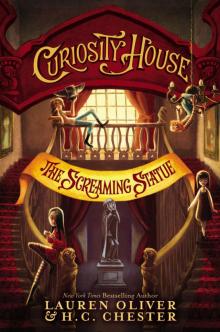 The Screaming Statue
The Screaming Statue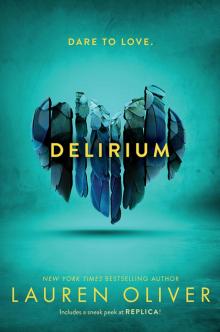 Delirium
Delirium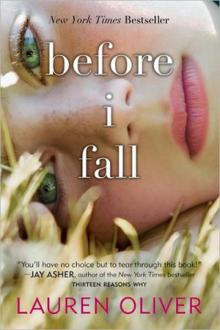 Before I Fall
Before I Fall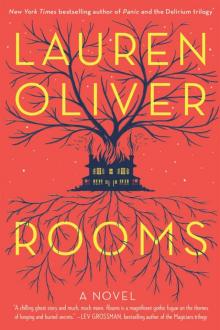 Rooms
Rooms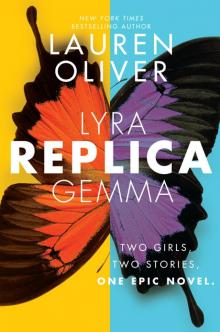 Replica
Replica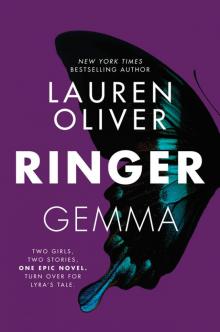 Ringer
Ringer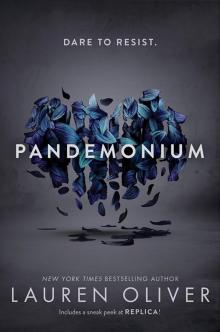 Pandemonium
Pandemonium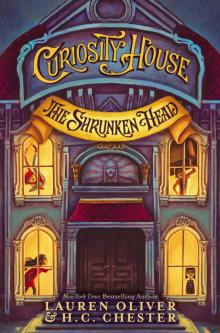 The Shrunken Head
The Shrunken Head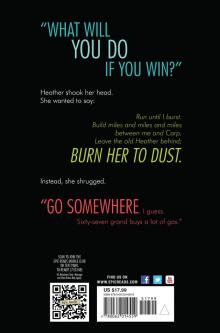 Panic
Panic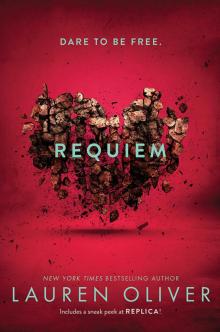 Requiem
Requiem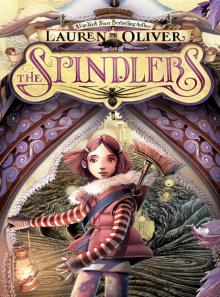 The Spindlers
The Spindlers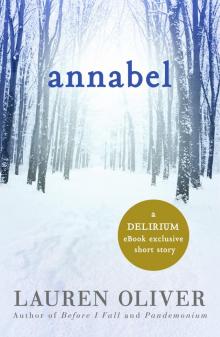 Annabel
Annabel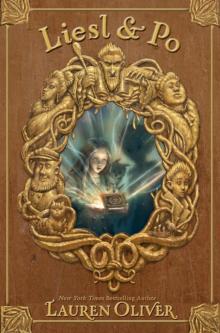 Liesl & Po
Liesl & Po Raven
Raven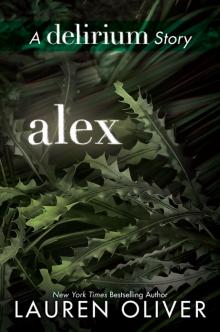 Alex
Alex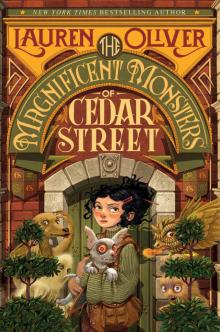 The Magnificent Monsters of Cedar Street
The Magnificent Monsters of Cedar Street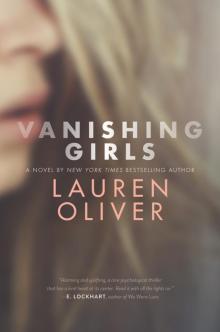 Vanishing Girls
Vanishing Girls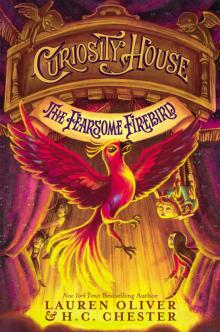 The Fearsome Firebird
The Fearsome Firebird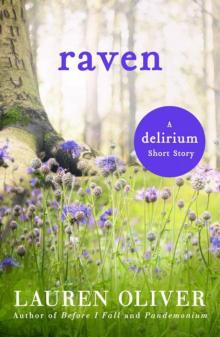 Raven: A Delirium Short Story
Raven: A Delirium Short Story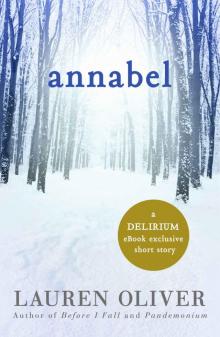 Annabel: A Delirium Short Story
Annabel: A Delirium Short Story Hana: A Delirium Short Story
Hana: A Delirium Short Story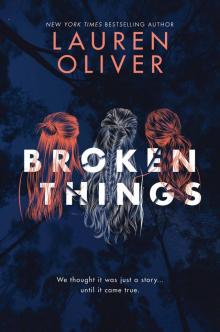 Broken Things
Broken Things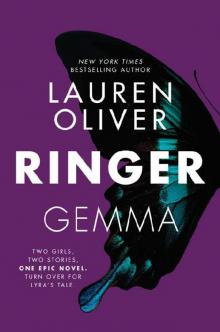 Ringer (Replica)
Ringer (Replica) Alex (delirium)
Alex (delirium)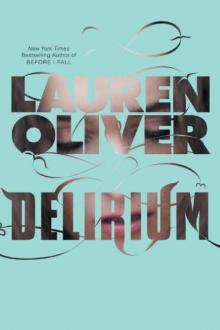 Delirium dt-1
Delirium dt-1